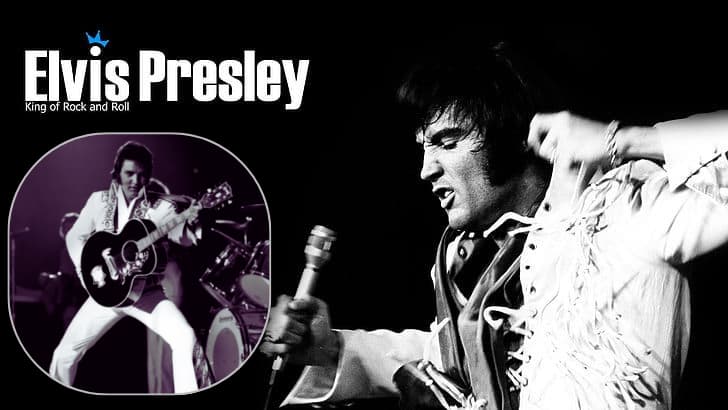
A Poignant Cry from the Urban Landscape: Elvis Presley’s “In the Ghetto” Echoes Through Generations
Ah, “In the Ghetto.” Just the title itself, for those of us who remember it from its first whisperings on the airwaves, conjures a cascade of emotions. This wasn’t just another song from Elvis Presley; it was a departure, a moment when the King of Rock and Roll, long associated with hip-swiveling exuberance and Hollywood gloss, stepped into a role that was both unexpected and profoundly impactful. Released on April 14, 1969, as part of his critically acclaimed comeback album, From Elvis in Memphis, “In the Ghetto” quickly climbed the charts. In the UK, it reached a peak position of No. 2, a truly impressive feat. In the United States, it was a Top 10 hit, cementing its place as one of his most significant songs of that era.
The story behind “In the Ghetto” is as compelling as the song itself, and it begins not with Elvis, but with the brilliant songwriter Mac Davis. Davis, a prolific country music singer-songwriter who would later achieve stardom in his own right, penned this poignant narrative. He had been wrestling with a concept he initially titled “The Vicious Circle,” a song about the inescapable cycle of poverty and despair. Growing up in Lubbock, Texas, Davis had witnessed firsthand the stark realities of life on the “wrong side of the tracks.” He carried with him the memory of a childhood friend, a Black boy who lived in a dirt-street neighborhood that stood in stark contrast to his own surroundings. This memory fueled his desire to write a song that depicted a child born into such circumstances, destined to follow a path of struggle and ultimately, tragedy.
The genius of Davis’s songwriting lies in its stark, unflinching honesty. The song paints a vivid picture: “On a cold and gray Chicago morn’ / A poor little baby child is born / In the ghetto.” It’s a cyclical tale, a tragic ballet of cause and effect. The mother cries, knowing she has another hungry mouth to feed. The child grows, “with a runny nose,” playing in the cold wind, his hunger burning. He learns to steal and to fight, a desperate means of survival in a world that offers little else. The narrative reaches its inevitable, heartbreaking climax when the young man, in desperation, buys a gun, steals a car, and is ultimately shot down, “face down on the street with a gun in his hand.” The final, crushing blow is the repetition of the opening lines – another baby is born “in the ghetto,” implying that the cycle of poverty and violence will continue, unbroken.
This wasn’t the kind of song people typically expected from Elvis Presley in 1969. After years of churning out forgettable movie soundtracks, Elvis was searching for material that resonated more deeply, that reflected the changing social landscape. The “’68 Comeback Special” had reignited his career, reminding the world of his raw talent and power. For his sessions at American Sound Studio in Memphis, overseen by producer Chips Moman, Elvis was eager to record more socially conscious material. It’s said that Mac Davis didn’t initially envision Elvis singing “In the Ghetto.” In fact, he reportedly offered it to Sammy Davis Jr., who, recognizing the song’s authenticity and power, suggested it might be better suited for Elvis, citing his own privileged upbringing as a reason he couldn’t do it justice.
When Elvis recorded “In the Ghetto,” he poured his entire being into it. The raw emotion in his voice, the solemnity with which he delivered each line, transcended his usual rock-and-roll persona. It was a performance that showcased his incredible depth as an artist, proving he was more than just a charismatic performer; he was a conduit for poignant storytelling. The song became a powerful statement, his first major hit with an overtly social message. It forced listeners to confront uncomfortable truths about systemic poverty and the lack of opportunity, urging them to look beyond their own comfortable lives and acknowledge the “vicious circle” that trapped so many.
For many of us who lived through those turbulent times, “In the Ghetto” was a stark reminder of the social inequalities that simmered beneath the surface of American prosperity. It wasn’t just a song; it was a lament, a call to empathy, and a haunting melody that echoed the cries of those often unseen and unheard. Even today, decades later, its message remains tragically relevant, a testament to Mac Davis’s insightful songwriting and Elvis Presley’s masterful, heartfelt delivery. It’s a song that sticks with you, a quiet but powerful force, making you pause and reflect on the enduring struggles of humanity.